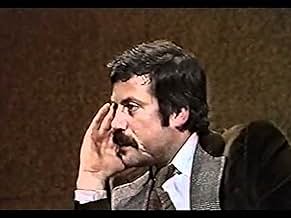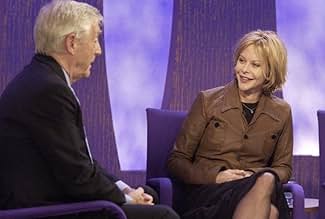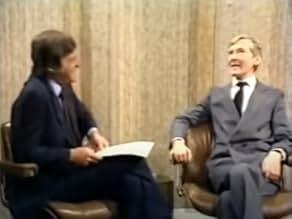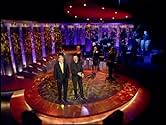Le journaliste Michael Parkinson interviewe un large éventail des personnes les plus célèbres du monde.Le journaliste Michael Parkinson interviewe un large éventail des personnes les plus célèbres du monde.Le journaliste Michael Parkinson interviewe un large éventail des personnes les plus célèbres du monde.
- A remporté le prix 1 BAFTA Award
- 4 victoires et 8 nominations au total
Parcourir les épisodes
Histoire
Le saviez-vous
- AnecdotesThe series finished in 1982 and was replaced as the BBC's prime time talk show by Wogan (1982) for over a decade. However, it returned to the BBC in 1998.
- ConnexionsEdited into Heroes of Comedy: Terry-Thomas (1995)
Commentaire en vedette
The 1970s was the golden age of British television for so many reasons, not least because it was a time when television executives still assumed their viewers were intelligent enough to watch somebody sitting in a chair and speaking at length, without the need for regular interruptions and jokes from the interviewer. Michael Parkinson, unlike today's chat show hosts, was not a comedian, he was a journalist, and his talent was simply for researching his subjects and showing an interest in what they had to say. The remarkable thing about Parkinson was the variety of the guests. His abilities as an interviewer meant that he was able to successfully deal with guests as different as raconteurs (Kenneth Williams, Peter Ustinov), poets (John Betjeman), authors (Leslie Thomas), musicians (Duke Ellington) and scientists (Jacob Bronowski). Parkinson never dominated the show, he was quite happy to let the guests do that. As a result, he gave British television its greatest chat show, a standard that most subsequent chat shows didn't even bother to attempt.
In the 1970s the big stars rarely gave interviews, there were three television channels and no videos, DVDs or Internet. Parkinson had provided a rare opportunity to see these people. Clearly, things could not be the same when, in 1998, the BBC decided to resurrect the series, 16 years since it had ended. A great deal had changed in television over that period. As the 1990s progressed, the talk show increasingly became the domain of comedians as hosts: Jonathan Ross, Clive Anderson, Frank Skinner and Graham Norton. As such, chat shows became more lightweight and more about the host than the guest. Also, with the explosion of the media in the 1980s and 1990s, another effect was the decline in the meaning of celebrity. The revival of Parkinson lasted for nearly ten years but, unfortunately, the show was dying a slow death, with the man all too often having to interview celebrities so minor that you couldn't have made them up in the 1970s: Trinny & Susannah, Simon Cowell, Sharon Osbourne and Gordon Ramsay for examples. As hard as he tried, Parkinson could never convince me that he was as interested in these people as the great stars of the original series. I certainly wasn't.
In fairness, when he had a good guest he was still better than anyone else. One of his greatest abilities was to interview celebrities who are instinctively private and dislike the spotlight on themselves as subjects. He was better than anyone else at making these stars feel comfortable and able to talk, with Rowan Atkinson and Bobby Charlton being prime examples. I actually think that from what I have seen, only his contemporaries David Frost and Melvyn Bragg rival Parkinson in this regard.
Parkinson has now wrapped up his chat show. He has said himself that his show was the last survivor of the talk shows based on conversation. Now, all we have are the comedy shows based on the American format. In some ways it's a shame, in other ways it isn't. Most of the really fascinating stars are now dead or very, very old. Very few modern stars captivate the attention for very long, as Parkinson found in the last few years. Because even Parkinson couldn't make people interesting if they simply weren't.
In the 1970s the big stars rarely gave interviews, there were three television channels and no videos, DVDs or Internet. Parkinson had provided a rare opportunity to see these people. Clearly, things could not be the same when, in 1998, the BBC decided to resurrect the series, 16 years since it had ended. A great deal had changed in television over that period. As the 1990s progressed, the talk show increasingly became the domain of comedians as hosts: Jonathan Ross, Clive Anderson, Frank Skinner and Graham Norton. As such, chat shows became more lightweight and more about the host than the guest. Also, with the explosion of the media in the 1980s and 1990s, another effect was the decline in the meaning of celebrity. The revival of Parkinson lasted for nearly ten years but, unfortunately, the show was dying a slow death, with the man all too often having to interview celebrities so minor that you couldn't have made them up in the 1970s: Trinny & Susannah, Simon Cowell, Sharon Osbourne and Gordon Ramsay for examples. As hard as he tried, Parkinson could never convince me that he was as interested in these people as the great stars of the original series. I certainly wasn't.
In fairness, when he had a good guest he was still better than anyone else. One of his greatest abilities was to interview celebrities who are instinctively private and dislike the spotlight on themselves as subjects. He was better than anyone else at making these stars feel comfortable and able to talk, with Rowan Atkinson and Bobby Charlton being prime examples. I actually think that from what I have seen, only his contemporaries David Frost and Melvyn Bragg rival Parkinson in this regard.
Parkinson has now wrapped up his chat show. He has said himself that his show was the last survivor of the talk shows based on conversation. Now, all we have are the comedy shows based on the American format. In some ways it's a shame, in other ways it isn't. Most of the really fascinating stars are now dead or very, very old. Very few modern stars captivate the attention for very long, as Parkinson found in the last few years. Because even Parkinson couldn't make people interesting if they simply weren't.
- matthew-58
- 22 mars 2008
- Lien permanent
Meilleurs choix
Connectez-vous pour évaluer et surveiller les recommandations personnalisées
- How many seasons does Parkinson have?Propulsé par Alexa
Détails
Contribuer à cette page
Suggérer une modification ou ajouter du contenu manquant

Lacune principale
By what name was Parkinson (1971) officially released in Canada in English?
Répondre


































